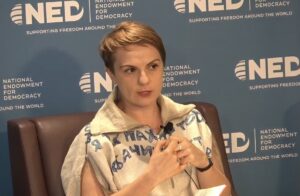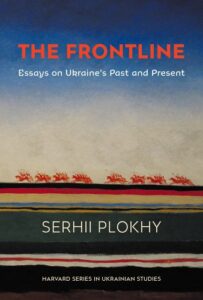The result of the war in Ukraine will shape the perceived efficacy of autocracy and democracy, one observer suggests.
Is the world witnessing a revisionist moment? the Munich Security Report asks. What are the consequences of Russia’s war on Ukraine? ? What are the main fault lines in the global contest of different visions for the future of the international order? And how can the coalition defending the vision of a liberal, rules-based order be enlarged and strengthened?
 The extraordinary resilience and determination of the Ukrainian people, as documented in the Munich Security Index 2023 (Spotlight Ukraine), has galvanized international support for their country’s struggle against the aggressor and instilled a new sense of purpose into democratic countries and governance formats. Liberal democracies need to use this momentum.
The extraordinary resilience and determination of the Ukrainian people, as documented in the Munich Security Index 2023 (Spotlight Ukraine), has galvanized international support for their country’s struggle against the aggressor and instilled a new sense of purpose into democratic countries and governance formats. Liberal democracies need to use this momentum.
The invasion of Ukraine reveals a few simple things, notes Christoph Heusgen, Chairman of the Munich Security Conference:
- First, Vladimir Putin’s decision to use military force against a peaceful neighbor has demonstrated that powerful actors believe they can ignore even the minimum standards of international law, such as the principle of territorial integrity. …Revisionist actors are trying to undermine the status quo and change the international order in many different ways.
- Second, we are far from helpless. Revisionism can be resisted. The Ukrainian people, first and foremost, have demonstrated a remarkable resilience and determination in the face of blunt aggression. ….. However, Ukraine has not won the war yet, and will need the support of all those who believe in the rule of law.
- Third, the fact that a considerable number of actors have not condemned Russia’s aggression shows that it is not enough for us to simply defend the status quo. If we do not address the resentment that countries in Africa, Latin America, and Asia feel toward the international order, which has not always served their interests, we will struggle to win the fence-sitters as allies in the defense of key rules and principles.
 The modern Russian occupation belongs to the equally old, equally ugly traditions of Russian imperialism and Soviet genocide. Moscow wants to obliterate Ukraine as a separate country, and Ukrainian as a distinct identity, say Anne Applebaum and Nataliya Gumenyuk (right).
The modern Russian occupation belongs to the equally old, equally ugly traditions of Russian imperialism and Soviet genocide. Moscow wants to obliterate Ukraine as a separate country, and Ukrainian as a distinct identity, say Anne Applebaum and Nataliya Gumenyuk (right).
The occupiers thought that task would be easy, because, like Putin, they assumed that the Ukrainian state and Ukrainian society are weak. But they are not. That clash between assumption and reality has also forced the occupiers to broaden their use of violence, they write for The Atlantic:
Wayne Jordash, a British barrister who documents Russian war crimes in Ukraine, argued in a Reckoning Project interview that the extraordinary number of detention centers in occupied Ukraine represent the Russian army’s attempt to fulfill its original plan, which was “to capture and kill all the leaders” of Ukraine. But as the occupation dragged on, “the idea of leaders got bigger. It was originally ‘Zelensky and the government,’ and it quite quickly, inevitably, became ‘local leaders,’ which includes everyone from military to civil servants to journalists, to teachers—anybody who had a connection with the Ukrainian state.”
Russia’s occupation belongs to the old, ugly traditions of Russian imperialism & Soviet genocide. Moscow wants to obliterate #Ukraine as a separate country & Ukrainian as a distinct identity, @anneapplebaum & @ngumenyuk write @TheAtlantic. https://t.co/2XWyxr5HMt
— Democracy Digest (@demdigest) February 14, 2023
Observers are concerned that the war is approaching a pivotal moment.
“It feels like we are playing for a long war,” said Andrea Kendall-Taylor, director of the Transatlantic Security Program at the Center for a New American Security. “I think it’s at odds with what so many people would hope for, that we’re actually trying to help Ukraine win militarily,” she told The Washington Post. “It feels like a moment of really high uncertainty.”
 Reducing human conflicts to battles between good and evil is always a risky proposition. But this “absolute war” of values comes as close to a clash of imperfect good and ever-darker evil as anything in the 75 years, analyst Cathy Young writes for The Bulwark.
Reducing human conflicts to battles between good and evil is always a risky proposition. But this “absolute war” of values comes as close to a clash of imperfect good and ever-darker evil as anything in the 75 years, analyst Cathy Young writes for The Bulwark.
Will it end in a true capitulation of tyranny? Maybe not; but a recent conversation with Natan Sharansky and Bernard-Henri Lévy made a powerful case for such a capitulation. If there was a takeaway from their conversation, it was that standing with Ukraine is not a fad du jour or a political strategy, but a true moral imperative.
Continuing to fight to win comes at a price. But the price for the common security of our transatlantic, democratic order would be many times higher if Western democracies now hesitate, fear and lose their nerve, say Jeffrey Gedmin of American Purpose and The Bulwark’s William Kristol.
It is time to stop Russian revanchism and imperialism with all our might, they write for Taggespiegel. It is time to clearly enforce the principle that wars of aggression cannot succeed, that the threat of nuclear weapons does not work, that there can and must be no “law of the strongest”. And it is time to stand with the courageous Ukrainians who are fighting and dying to defend their democracy and freedom, every day, every night of bombing.
 An entire society is mobilized in this battle, adds Oxford University’s Timothy Garton Ash. The Ukrainian state has had a checkered record over the three decades since the country gained independence in 1991, but Ukrainian civil society has grown from strength to strength, through three major episodes of popular mobilization: the Orange Revolution of 2004–2005; the Euromaidan, or Revolution of Dignity, in 2013–2014; and the response to the Russian invasion in 2022, he writes in a NYRB review of Unmaking Imperial Russia: Mykhailo Hrushevsky and the Writing of Ukrainian History by Serhii Plokhy; Der Krieg gegen die Ukraine: Hintergründe, Ereignisse, Folgen [The War Against Ukraine: Background, Events, Consequences] by Gwendolyn Sasse; The Zelensky Effect (above) by Olga Onuch and Henry E. Hale; The Frontline: Essays on Ukraine’s Past and Present by Serhii Plokhy, Harvard Ukrainian Research Institute.
An entire society is mobilized in this battle, adds Oxford University’s Timothy Garton Ash. The Ukrainian state has had a checkered record over the three decades since the country gained independence in 1991, but Ukrainian civil society has grown from strength to strength, through three major episodes of popular mobilization: the Orange Revolution of 2004–2005; the Euromaidan, or Revolution of Dignity, in 2013–2014; and the response to the Russian invasion in 2022, he writes in a NYRB review of Unmaking Imperial Russia: Mykhailo Hrushevsky and the Writing of Ukrainian History by Serhii Plokhy; Der Krieg gegen die Ukraine: Hintergründe, Ereignisse, Folgen [The War Against Ukraine: Background, Events, Consequences] by Gwendolyn Sasse; The Zelensky Effect (above) by Olga Onuch and Henry E. Hale; The Frontline: Essays on Ukraine’s Past and Present by Serhii Plokhy, Harvard Ukrainian Research Institute.
These are the faces of mayors and municipal leaders in occupied Ukraine who have been arrested, tortured, forced to flee their homes. Anyone with an elected position is a potential target. pic.twitter.com/o5lqOefIaw
— Anne Applebaum (@anneapplebaum) February 14, 2023







